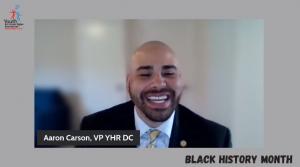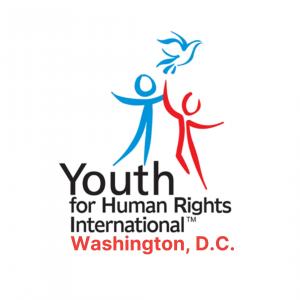A Selma march organizer and a grandson of blues legend B.B. King teach civil rights history and the meaning of equality
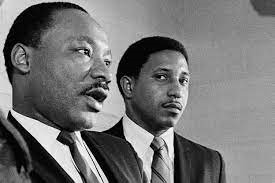
Dr. Martin Luther King, Jr. with Bernard Lafayette, Jr.
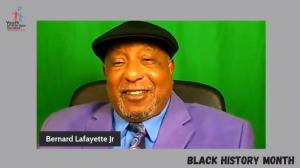
Bernard Lafayette, Jr. speaking on his work with Dr. Martin Luther King, Jr. on teaching nonviolence. He said that youth are the most important group to reach regarding human rights and nonviolence.
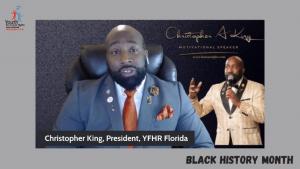
Christopher King, grandson of B.B. King and president of Youth for Human Rights Florida speaking on Black History Month. He urges youth to follow the UN Declaration on Human Rights and respect the rights of others.
Youth for Human Rights urges youth to get involved in promoting human rights and teaching Martin Luther King’s message of nonviolence and real equality.
In the Black History event, Dr. Lafayette encouraged youth to be involved, even suggesting the forming of model youth legislative groups to train youth on government and nonviolence as well as to register new voters. He pointed out that the youth who have only recently turned 18 are the largest group of unregistered voters.
Speaking of the history that he lived, Lafayette told of the day that Dr. Martin Luther King, Jr. was killed. He had met with Dr. King that morning at the hotel. Dr. Lafayette was staying a floor below Dr. King and had prepared a press statement for an upcoming event to be held in Washington, DC. Dr. Lafayette went to Dr. King’s room to get the press statement for DC approved. At the end of that meeting, Dr. King told him, “Go on. I will be there soon.” He added, “Our next movement is going to be international and [will] institutionalize non-violence.”
Dr. Lafayette explained how the civil rights movement was successful because the organizations coordinated and worked together to address issues. It wasn’t just the Southern Christian Leadership Conference (Dr. King’s group) but the Student Nonviolent Coordinating Committee (SNCC), the Poor People’s Campaign, the Congress of Racial Equity (CORE), and NAACP as well as other groups working together. Dr. Lafayette made the point that coalitions must be formed and work together to correct one social problem, then work on another problem. Dr. Lafayette continues to train groups on nonviolent protests and campaigns as well as creating coalitions.
He also told the listeners about marching in Selma. Dr. Lafayette didn’t march in the front of the group; Dr. King asked him to be in charge of security for the back of the march. Often police and others would attack marchers from the back, and it was important for the leaders of the march not to worry about the rear. Under Dr. King’s direction, Dr. Lafayette trained gang members from Chicago in nonviolence and how to do security without inciting or participating in violence. He then brought them down to Selma for the march to be that rear security team.
Joining Dr. Lafayette in talking about Black History and his current programs was the President of Youth for Human Rights Florida, Mr. Christopher King, grandson of blues great B.B. King, and the founder of The Gentlemen’s Course, Inc.
Mr. King works in cities throughout Florida teaching today’s youth about nonviolence, while training young men to be respectful, have manners, get jobs and keep those jobs. Seeing a lack of respect and equality as a major hindrance to youth doing well in life, Mr. King spoke about his use of educational materials from Youth for Human Rights International (YHRI) to teach the UN Universal Declaration of Human Rights (UDHR).
The UDHR was created and passed by the United Nations in 1948, yet surveys internationally show that very few people are aware of the 30 human rights guaranteed under the declaration. Several of those rights apply to the civil rights movement, including No Discrimination, the Right to Expression, the Right to Democracy, and the Right to Public Assembly and Association, and the Right to Education.
Addressing racism, Mr. King said, “Aren’t we all one race of people? We are all human beings.” Mr. King teaches youth that they have to respect the rights of others and know their own rights so they can demand their rights be respected and protected.
Vice president of Youth for Human Rights International’s Washington, DC, chapter, Mr. Aaron Carson, commented, “Youth for Human Rights International has worked tirelessly to spread this message around the globe…. It is more important than ever today that everyone stand up for human rights.” Mr. Carson emceed the event.
Youth for Human Rights International (YHRI) is a nonprofit organization founded in 2001. The purpose of YHRI is to teach youth about human rights, specifically the United Nations Universal Declaration of Human Rights, and inspire them to become advocates for tolerance and peace.
Beth Akiyama
Youth for Human Rights International - National Office
+1 202-667-6404
email us here
Legal Disclaimer:
EIN Presswire provides this news content "as is" without warranty of any kind. We do not accept any responsibility or liability for the accuracy, content, images, videos, licenses, completeness, legality, or reliability of the information contained in this article. If you have any complaints or copyright issues related to this article, kindly contact the author above.

